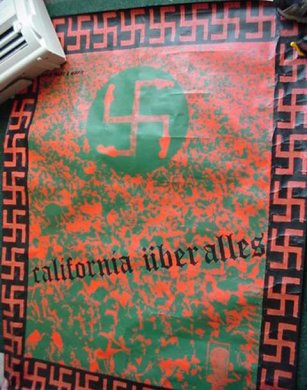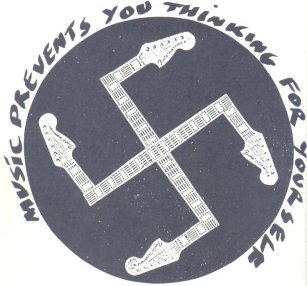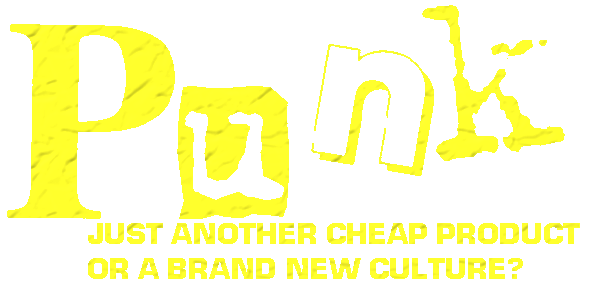These graphics date from the final days of Jamie Reid's relationship with the Sex Pistols and Virgin Records. They articulate, all
too clearly, his disgust with the whole music industry. None of these were ever used at the time, except for the guitar swastika -
minus the explanatory caption -- which found its way on to the inner label of another Virgin cheapie, 'Sid Sings' (released 7.12.79,
Virgin V2144) comprising live tapes recorded by John Tiberi aka Boogie at Sid's 1978 Max's Kansas City dates).
Below are some details on the use of swasticas in artist Jamie Reids work in punk. Plus an interview conducted in 1986 by Jon
Savage with Jamie Reid which was taken from Savage's book on the artist called Up They Rise! The Incomplete Works Of
Jamie Reid (Faber And Faber, ISBN 0-571-14762-3) that came out in 1987. And finally a letter written to the British music paper
New Musical Express by Jamie Reid, explaining the inspiration for his "stratoswasticastor" .
The poster on the right uses a leafed cannabis swastica border with the "stratoswasticastor" in the centre over layed on
a 'Holidays In The Sun' poster beach scene.. It was printed in orange and dark green, for the UK release of the Dead
Kennedys' 'California Uber Alles' 45 by Bob Last's Fast Product, Autumn 1979.
UP THEY RISE Interview.
Q: One thing I wanted to ask you about was the use of swastikas which you made at this stage.
A: It was to do with the situation at Virgin at the time. I had this graphic of a swastika made out of cannabis
leaves which I'd done for a Dead Kennedys poster - partly as a dig at them and the whole California thing - and
I re-used it for very specific reasons.
Q: Like?
A: It was this whole thing about hippies becoming media people, like Richard Branson. You'd go into Virgin
Records, and you'd meet someone you'd never met before, and it would be intimate first names, and have a
joint, it's cool. We always tried to insist that we called people Mr Branson, Mr Draper, Mr Slater, none of this
chummy chummy thing, it's business. The cannabis swastika summed up what I felt about Virgin, and the guitar
swastika summed up what I felt about the music industry at that stage, which had just beaten us in a prolonged
power struggle. It never saw the light of day.
Q: It did on the Sid Sings Ip label.
A: Well that wasn't my choice. Things had fallen apart by then.
Q: I know the 'God Save The Queen' swastika graphic never came out but there were a lot of swastikas used
in early punk, maybe rather indiscriminately.
A: I think the joke was overplayed, not not so much about the Queen but her as a representative of the British
establishment.
Q: Couldn't it have been misconstrued?
A: Yes, but only for a particular reason - because it is pop and pop gets media attention. To a considerable
extent, it's pretty minimal compared to what really changes anything politically. A few punks wearing swastikas or
even the very few sleeves that might have references to swastikas on them - was nothing to what we were going
to get under Thatcherism. You could write ten books on it. I doubt every move I've made personally and I
sometimes feel very guilty - or not so much guilty as responsible for a lot to do with the Pistols. And for
other things that I was involved in, from direct action to the Suburban Press. For many years, I thought terrorism
was the only answer. I don't now. If you have to come up with one line, I suppose it's being true to yourself. I know that, if I link the Suburban Press days with the
Pistols days, it's taken me a long time to get over a lot of scars.
Jamie Reid talking to Jon Savage, August 1986
Swastika Saga Goes On
Now Artist Rushes To His Own Defence
After last weeks letter to Thrills (NME) from Richard Branson comes a letter from Jamie Reid, the artist
responsible for the swastika design. Once again, we'll let you make up your own minds who's right.
Dear Thrills/Danny Baker,
Thanks By printing the "Stratoswasticastor" on your Thrills page. It will be seen by perhaps
600,000 instead of the odd sixty thousand that may buy the Sid Sings album. Before going into the
reasons why it is better seen by as many people as possible, here is some background information.
The story goes at least as far back as the Some Product record. This was the first album to be
released after the Court Case in which British justice combined with the music industry in the form
of Virgin Records and others to bring about the demise of Glitterbest. (The company was put into
the hands of the receivers, a firm of accountants called Spicer and Pegler, who still run it today).
Virgin were then in a position to pick up the lucrative pieces and make some money. Jamie Reid,
who had previously done all the Sex Pistols artwork decided to carry on and see if there was a
way in which sleeves and advertisements could be used to show the exploitative and oppressive
nature of the music industry.
The sleeve for 'Some Product' was designed by Jamie Reid and Trevor Key. The record itself was described by its producer as being "forty
minutes of absolute rubbish" and the problem facing them was how to design a cover which would actively discourage sales and
demythologise the Sex Pistols, who by that time didn't even exist as a band. It seemed an unhealthy situation had developed, in which the
Hero status of the Sex Pistols couldn't be broken. People would buy anything that had their name on it. Like Henry Cooper and Brut, the
Sex Pistols name was being used to sell a record which was nothing at all to do with -them. The sleeve would, of course, have to be
acceptable to the record company. Incidentally, neither Reid nor Key are employed by the much maligned and abused Virgin Art Dept.,
there isn't one.
The collection of products on the sleeve is an attempt to show that the music industry, like any other, will thoroughly exploit all avenues
open to it to make noney, using all the conventional "marketing practices and product spin-offs. The title of the album was thought up by
Trevor Key and not the record company. Anyone who would listen to this record after seeing the sleeve must have been suspending disbelief
and anyone buying it after listening to it, obviously wanted it. Next comes the Credit Card on The Great Rock 'N' Roll Swindle'. This single
was already on the album of the same name and releasing it was a breach of contract (only four singles per album and this was the fifth
-again the music industry was cashing in on a record, which none of the people involved in making it had any control over its release and
received very little money for it. So again, how to design a telling sleeve.
Record companies and their employees are constantly maligned in the music papers for their expense account lunches and their eagerness to
wave their American Express cards (though why is unclear, since who would want to carry that much cash). So why not use this symbol to
show the way in which record companies (and not just Virgin, they're all at it) use the talents of their artists to make money and then more
money. The Credit Card, then, is shown with the Sex Pistols (or the artist) as being the supplier of cash/credit and Virgin Records (the music
business) as the insatiable recipient of the money earned by the artist. In the event, American Express took exception to the sleeve and
injuncted the record. Right results, wrong reasons.
Now, coming back to the use of the swastika. This was designed by Jamie Reid to be used on a poster for 'California Uber Alles' by The
Dead Kennedys (the lyrics are about the new style of "fascism" by the so-called liberal Jerry Brown). It was subsequently decided by Jamie
Reid and Trevor Key to use it on as many music industry products as possible. Its use is to try and show the oppressive nature of the music
industry. That people are being fed pap to keep them from thinking and acting. That the music industry is set up with the sole single aim of
making money. That it is condoned by the powers that be, simply because it is a sop to people who might otherwise be constructive about
their own dire circumstances.
In each and every instance the music papers have failed to pick up on any one of these visual pointers. They could reveal the true nature of
an industry which sees talent as product and product as money and money as power. "Art" is a swear word in the music industry. But the
journalists trudge on, supported defending the musio-industry, by occasionally attacking one company or another for releasing a record for
purely financial reasons. All records are relsased to make money. Don't be surprised to see the "Stratoswasticastor" on Andy Williams' next
record.
JAMIE REID - 1980
too clearly, his disgust with the whole music industry. None of these were ever used at the time, except for the guitar swastika -
minus the explanatory caption -- which found its way on to the inner label of another Virgin cheapie, 'Sid Sings' (released 7.12.79,
Virgin V2144) comprising live tapes recorded by John Tiberi aka Boogie at Sid's 1978 Max's Kansas City dates).
Below are some details on the use of swasticas in artist Jamie Reids work in punk. Plus an interview conducted in 1986 by Jon
Savage with Jamie Reid which was taken from Savage's book on the artist called Up They Rise! The Incomplete Works Of
Jamie Reid (Faber And Faber, ISBN 0-571-14762-3) that came out in 1987. And finally a letter written to the British music paper
New Musical Express by Jamie Reid, explaining the inspiration for his "stratoswasticastor" .
The poster on the right uses a leafed cannabis swastica border with the "stratoswasticastor" in the centre over layed on
a 'Holidays In The Sun' poster beach scene.. It was printed in orange and dark green, for the UK release of the Dead
Kennedys' 'California Uber Alles' 45 by Bob Last's Fast Product, Autumn 1979.
UP THEY RISE Interview.
Q: One thing I wanted to ask you about was the use of swastikas which you made at this stage.
A: It was to do with the situation at Virgin at the time. I had this graphic of a swastika made out of cannabis
leaves which I'd done for a Dead Kennedys poster - partly as a dig at them and the whole California thing - and
I re-used it for very specific reasons.
Q: Like?
A: It was this whole thing about hippies becoming media people, like Richard Branson. You'd go into Virgin
Records, and you'd meet someone you'd never met before, and it would be intimate first names, and have a
joint, it's cool. We always tried to insist that we called people Mr Branson, Mr Draper, Mr Slater, none of this
chummy chummy thing, it's business. The cannabis swastika summed up what I felt about Virgin, and the guitar
swastika summed up what I felt about the music industry at that stage, which had just beaten us in a prolonged
power struggle. It never saw the light of day.
Q: It did on the Sid Sings Ip label.
A: Well that wasn't my choice. Things had fallen apart by then.
Q: I know the 'God Save The Queen' swastika graphic never came out but there were a lot of swastikas used
in early punk, maybe rather indiscriminately.
A: I think the joke was overplayed, not not so much about the Queen but her as a representative of the British
establishment.
Q: Couldn't it have been misconstrued?
A: Yes, but only for a particular reason - because it is pop and pop gets media attention. To a considerable
extent, it's pretty minimal compared to what really changes anything politically. A few punks wearing swastikas or
even the very few sleeves that might have references to swastikas on them - was nothing to what we were going
to get under Thatcherism. You could write ten books on it. I doubt every move I've made personally and I
sometimes feel very guilty - or not so much guilty as responsible for a lot to do with the Pistols. And for
other things that I was involved in, from direct action to the Suburban Press. For many years, I thought terrorism
was the only answer. I don't now. If you have to come up with one line, I suppose it's being true to yourself. I know that, if I link the Suburban Press days with the
Pistols days, it's taken me a long time to get over a lot of scars.
Jamie Reid talking to Jon Savage, August 1986
Swastika Saga Goes On
Now Artist Rushes To His Own Defence
After last weeks letter to Thrills (NME) from Richard Branson comes a letter from Jamie Reid, the artist
responsible for the swastika design. Once again, we'll let you make up your own minds who's right.
Dear Thrills/Danny Baker,
Thanks By printing the "Stratoswasticastor" on your Thrills page. It will be seen by perhaps
600,000 instead of the odd sixty thousand that may buy the Sid Sings album. Before going into the
reasons why it is better seen by as many people as possible, here is some background information.
The story goes at least as far back as the Some Product record. This was the first album to be
released after the Court Case in which British justice combined with the music industry in the form
of Virgin Records and others to bring about the demise of Glitterbest. (The company was put into
the hands of the receivers, a firm of accountants called Spicer and Pegler, who still run it today).
Virgin were then in a position to pick up the lucrative pieces and make some money. Jamie Reid,
who had previously done all the Sex Pistols artwork decided to carry on and see if there was a
way in which sleeves and advertisements could be used to show the exploitative and oppressive
nature of the music industry.
The sleeve for 'Some Product' was designed by Jamie Reid and Trevor Key. The record itself was described by its producer as being "forty
minutes of absolute rubbish" and the problem facing them was how to design a cover which would actively discourage sales and
demythologise the Sex Pistols, who by that time didn't even exist as a band. It seemed an unhealthy situation had developed, in which the
Hero status of the Sex Pistols couldn't be broken. People would buy anything that had their name on it. Like Henry Cooper and Brut, the
Sex Pistols name was being used to sell a record which was nothing at all to do with -them. The sleeve would, of course, have to be
acceptable to the record company. Incidentally, neither Reid nor Key are employed by the much maligned and abused Virgin Art Dept.,
there isn't one.
The collection of products on the sleeve is an attempt to show that the music industry, like any other, will thoroughly exploit all avenues
open to it to make noney, using all the conventional "marketing practices and product spin-offs. The title of the album was thought up by
Trevor Key and not the record company. Anyone who would listen to this record after seeing the sleeve must have been suspending disbelief
and anyone buying it after listening to it, obviously wanted it. Next comes the Credit Card on The Great Rock 'N' Roll Swindle'. This single
was already on the album of the same name and releasing it was a breach of contract (only four singles per album and this was the fifth
-again the music industry was cashing in on a record, which none of the people involved in making it had any control over its release and
received very little money for it. So again, how to design a telling sleeve.
Record companies and their employees are constantly maligned in the music papers for their expense account lunches and their eagerness to
wave their American Express cards (though why is unclear, since who would want to carry that much cash). So why not use this symbol to
show the way in which record companies (and not just Virgin, they're all at it) use the talents of their artists to make money and then more
money. The Credit Card, then, is shown with the Sex Pistols (or the artist) as being the supplier of cash/credit and Virgin Records (the music
business) as the insatiable recipient of the money earned by the artist. In the event, American Express took exception to the sleeve and
injuncted the record. Right results, wrong reasons.
Now, coming back to the use of the swastika. This was designed by Jamie Reid to be used on a poster for 'California Uber Alles' by The
Dead Kennedys (the lyrics are about the new style of "fascism" by the so-called liberal Jerry Brown). It was subsequently decided by Jamie
Reid and Trevor Key to use it on as many music industry products as possible. Its use is to try and show the oppressive nature of the music
industry. That people are being fed pap to keep them from thinking and acting. That the music industry is set up with the sole single aim of
making money. That it is condoned by the powers that be, simply because it is a sop to people who might otherwise be constructive about
their own dire circumstances.
In each and every instance the music papers have failed to pick up on any one of these visual pointers. They could reveal the true nature of
an industry which sees talent as product and product as money and money as power. "Art" is a swear word in the music industry. But the
journalists trudge on, supported defending the musio-industry, by occasionally attacking one company or another for releasing a record for
purely financial reasons. All records are relsased to make money. Don't be surprised to see the "Stratoswasticastor" on Andy Williams' next
record.
JAMIE REID - 1980





